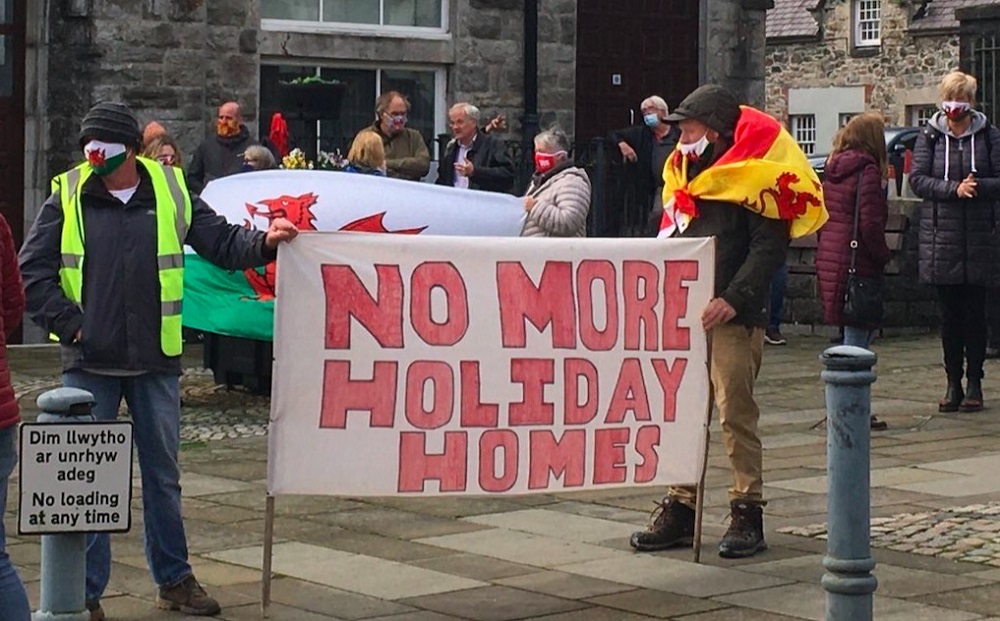Holiday hotspots consider plans to increase second home premium

Gareth Williams, local democracy reporter
Anglesey Council has officially kicked off a public consultation on proposals to hike the holiday home premium from 35% to 50%.
The move follows a decision by the council’s Executive last December to look at increasing the premium to “at least” 50% by April 2022, subject to a public engagement exercise.
It comes as more pressure is heaped on the Welsh Government by campaign groups and politicians to amend the law and respond to a growing housing crisis.
Introduced in 2017 the 25% second and long term empty home levy – increased to 35% in 2019 – saw Anglesey become of the first authorities to bring in the charge, with the proceeds targeted towards helping local first-time buyers onto the ladder.
But following claims that a “loophole” is costing Anglesey Council as much as £1m a year, councillors on both the island and elsewhere have also urged the Welsh Government to change the law amid fears that the percentage of housing designated as second homes will only rise.
Launching the consultation, the finance portfolio holder said that with 2,067 – or around 7% – of island properties being unoccupied for much of the year, the extra funding would help more locals get onto the housing ladder.
Cllr Robin Williams added: “Through this consultation process we’ll be seeking the views of Anglesey residents, owners of second homes on the island and operators of self-catering accommodation.
“The existing premium charge on second homes has already helped us support Anglesey residents to secure their first homes and live in their local communities.
“Raising the premium would allow us to give more of our young people that extra support needed to get on the housing ladder, which is currently so difficult because of high property prices.”
The authority expects the second home premium to bring in £993,947 during 2021/22 – but a report found last year that this figure would increase to £1.41m if that premium were hiked to 50%.
Gwynedd
Neighbouring Gwynedd Council already charges 100% but Anglesey and several other authorities have so far resisted hiking the premium to the maximum permitted figure amid concerns it could encourage more second home owners to exploit a “loophole” to avoid paying the premium, or often any council tax at, all by “flipping” towards paying non-domestic rates.
Such a move can be actioned if it’s proved that the property is available for up to 140 days in a year and actually let for at least 70.
But with most self-catering holiday accommodation being eligible for Small Businesses Rates Relief, it often results in no contribution at all into local authority coffers.
The First Minister recently endeavoured to act on the findings of a Welsh Government commissioned report on the impact on many Welsh speaking communities.
But Dr Simon Brooks’ study found that authorities may be “weakening their case” for action by not charging the full premium.
“From a public policy perspective, it becomes more difficult to justify a change to planning legislation if existing taxation powers are not used,” noted the report, which has recommended 12 steps which include changes to the planning and taxation systems.
“It is in the public interest therefore that county councils in areas where there is a high number of second homes use their taxation powers fully.”

Speaking during a meeting of Gwynedd’s Cabinet on Tuesday, however, the authority’s deputy leader urged Mark Drakeford to implement Dr Brooks’ findings in full.
“The major fear is there may be too many recommendations and the Government may make the wrong choice and pick one easy to implement recommendation which will have very little effect, but say they’ve dealt with the problem,” said Cllr Dafydd Meurig.
Urging an amendment to the Town and Country Planning (Use Classes) Order to include an additional use class for short-term holiday accommodation, Gwynedd’s cabinet also backed calls for the introduction of a mandatory licensing scheme for short-term holiday accommodation, which would be the responsibility of the Local Authority.
Cllr Meurig went on to argue that changing Section 66 of the Local Government Finance Act would mean that any dwelling house is defined as such for tax purposes and liable to pay Council Tax and any resulting premium, regardless of it being used as a second home or holiday let.
This, he concluded, would close the “loophole” allowing second homes to benefit from the Small Business Rate Relief scheme.
Anglesey Council’s online consultation can be found here and closes on August 6.
Support our Nation today
For the price of a cup of coffee a month you can help us create an independent, not-for-profit, national news service for the people of Wales, by the people of Wales.






It is not just the holiday homes and lets but the service industries involved in catering for the tourists and their elevated position in the planning pecking order that distorts the life experience of the non-tourist dependant local person. From too much car-parking in the winter to pinching local street parking in the summer. The scramble for every last cubic inch of space, to squeeze the last pound in profit and to hell with bleating “locals” who should be grateful for below minimum wage pay rates. Cheshire-based business owners who saw Covid as an excuse not to pay local builders… Read more »
And turkeys vote for Christmas . . . (Wales just scored, thank goodness for that). What we actually need is some reliable data on second homes. The figures given on the Ynys Mon consultation – that there are 106 Band G properties listed as second homes – are laughable. Plus the rate of new build and upgrades since the last data the Councils use, at least 25 new places in my village alone in the last 6 months. The first requirement must be for a proper survey done centrally and independently, not relying on local councils and council officers who… Read more »
What are they messing about for? !00% and no less! What are they afraid of? Scaring holiday home owners away, or something?